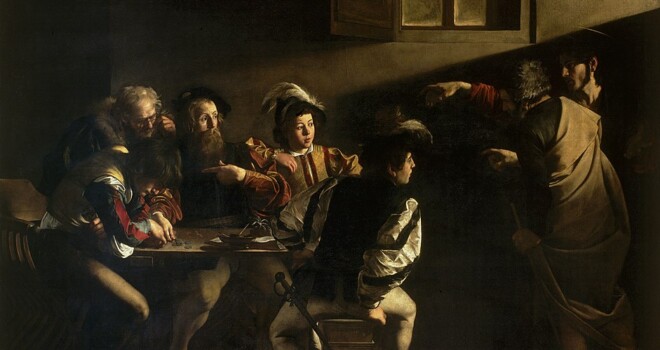As Jesus passed by, he saw a man named Matthew sitting at the customs post. He said to him, “Follow me.” (Mt 9:9)
We can learn more about Jesus’ early ministry from His choosing Matthew for a disciple than perhaps from any other disciple chosen. What makes the choice of Matthew so telling about Jesus’ ministry?
Years ago, I had invited a group of friends to meet at a coffee shop to pray the rosary together. These were friends from different circles, but praying the rosary was something we all had in common, so I figured no one would mind who I had chosen to invite. In fact, I knew that two of the people who were coming had been acquaintances years before, so I assumed that it would be a welcome surprise.
It wasn’t. When the friend who arrived first saw the other enter the scene, they exchanged a few pleasantries, and then she abruptly interjected, “I forgot I have something else to do. I have to go.” It was obvious by the look on her face that the only thing “else” she had to do was to remove herself from the presence of this other woman. I had no idea what had transpired between them, but it was clear there was a wound that had been left unhealed in my friend’s heart. Painful enough that even a rosary wasn’t worth sitting at table with her.
When Jesus chose Matthew to follow Him, He was asking to join to His band of followers a man who had inflicted damage directly upon the very ones who sat around the table with Him.
The term “tax collector” has lost its startling effect on us these many centuries later, but to the first century Jews, “tax collector” was not synonymous with someone who was “just doing his job.” Why? Because the way the tax collector was paid by the Roman bureaucracy was by being permitted to keep whatever money he collected above and beyond the amount of tax that was owed. Therefore, it was common practice for tax collectors to extort far more than their “fair” due, and often, far more than the family whose tax had been collected could afford.
The greed of the tax collector had the potential to bring a hard-working family to financial ruin. To them, the term “tax collector” was synonymous with “thief.” He was feared and despised by both Jewish officials and poor families alike; the entire Jewish population was adversely impacted by his intimidation. And that Matthew was a Jew himself made his actions most injurious of all. He didn’t just extort from his own people; he betrayed them. Nobody would have been more despised in the early Jewish community than Matthew. He was the lowest of the low.
Given this backdrop, we can understand the scandal that was created by Jesus’ choice of Matthew in the minds of the Pharisees. Even if they were inclined to forgive Matthew, they certainly wouldn’t have understood the concept of forgiveness the way Jesus came to explain it (“seventy times seven times”); what’s more, forgiveness takes time.
There is a process we must undergo before forgiveness for the one who has injured us can be complete. First, we must accept that the offense has happened to us. Then, we must strive to see the hand of God in our pain, and trust that He intends a greater good for our lives.
To will to kiss the hands of the one who offended us, as St. Josephine Bakhita did towards her captors, requires grace. But, it seems, Jesus didn’t offer that time and grace to the ones who were loath to accept Matthew as part of His crew. He didn’t explain His reasons, require Matthew to say he was sorry and give everyone a hug, or even force Matthew to pay back the money he stole before expecting the Pharisees to forgive him.
What does Jesus tell the Pharisees instead? He tells them, “GO.” Go? Why should they go? Matthew’s the one who needs to go! But of course, Jesus isn’t telling them to go, as in, “Go away.” He tells them to go in order to “learn the meaning of the words, I desire mercy, not sacrifice.” In other words, Jesus is instructing them to go to the temple and search the Scriptures. He’s telling them to go to the temple of their hearts to hear the Father speak.
Better than any words Jesus could say to them in that moment while their souls are in a disposition of anger and disturbance, are the words they will receive once their souls are at peace. It is there in the temple that they will understand what Jesus is doing by choosing Matthew. It is there in the temple that their resentment and anger towards Matthew will be lifted. It is there in the temple that they will finally be able to forgive. It is there in the temple that they will finally be able to see.
I did not come to call the righteous but sinners.
Jesus is not denying that what Matthew did was awful. In fact, He has just called Matthew a “sinner,” counted among the ones for whom He came. Jesus has no intention of pretending what Matthew did wasn’t wrong, sweeping it under the rug, or otherwise ignoring it. Scripture tells us very little about the conversation that transpired between Jesus and Matthew after the Pharisees left, but we can be sure of this: whatever Jesus said to him, it wasn’t, “That’s okay.” Matthew would have finally been able to see that what he had done wasn’t okay.
Matthew is now a changed man. By the grace of God, his transformation is instantaneous too—that’s how powerful Matthew’s encounter is with the Lord. Scripture tells us it was so powerful that “he got up” and left his custom post right then and there and followed Jesus. Tradition tells us that his encounter was so powerful that he not only paid back the money he had extorted from his community; he repaid those he cheated four-fold.
What was so powerful about his encounter with Jesus, that the Master didn’t have to say, “What you did was wrong” or “Pay back what you owe “? When my six-year-old does something wrong, those are exactly the words I must use because he either doesn’t know what he did was wrong, or if he does know, then he needs a punishment that fits the crime. But this is not how Jesus treats Matthew. He treats him with the mercy God desires.
So what does this tell us about the meaning of the words, “I desire mercy, not sacrifice”? It tells us the same thing that Jesus wanted the Pharisees to learn: that the way to true discipleship and love of God is not going to come about through strict disciplines and adherences to law. Strict discipline and adherences to law would make for a pious believer, but only mercy turns that soul into one who loves with the heart of Christ.
Caravaggio. (1599-1600). The Calling of Saint Matthew [oil on canvas]. Retrieved from Wikimedia Commons.










